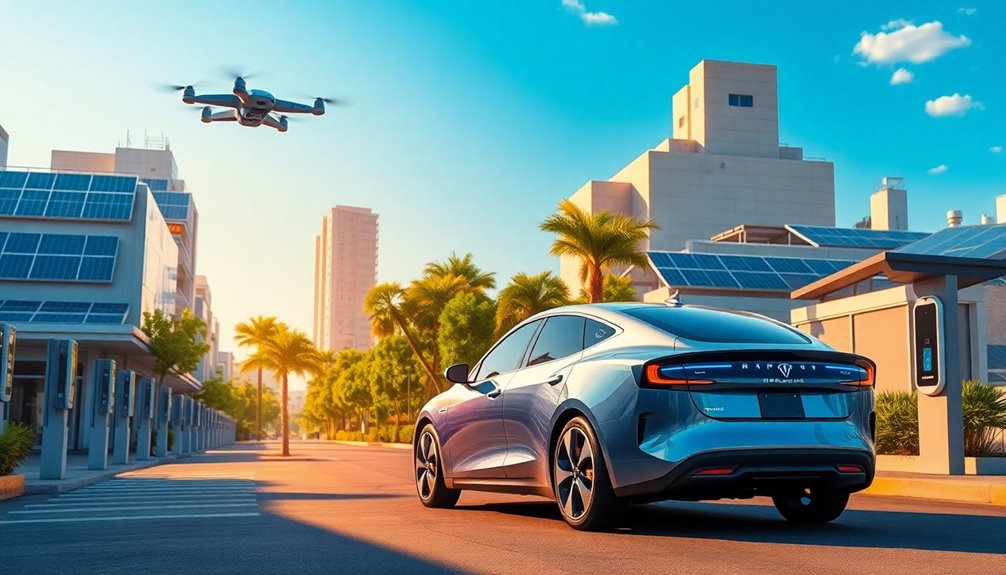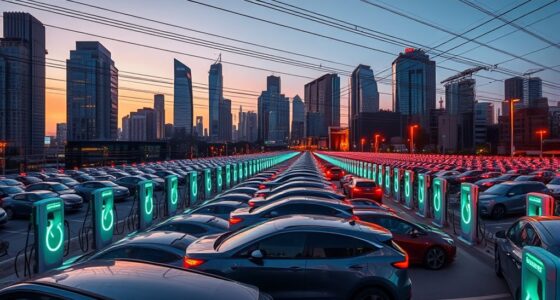The future of electric vehicles looks promising with rapid advancements in battery technology, enhancing range and charging speeds. Expanding charging infrastructure is making it easier for you to find convenient charging options. Plus, government incentives are lowering your costs, while autonomous driving capabilities are improving your experience on the road. With renewable energy integration, sustainable driving is within reach. There's much more to explore about how these developments will shape your EV journey ahead.
Key Takeaways
- Advancements in battery technology will increase energy density, resulting in longer EV ranges and faster charging times.
- Expanding charging infrastructure will alleviate range anxiety, making EVs more convenient for everyday use.
- Government incentives and policies will continue to make EV ownership more affordable and appealing.
- Enhanced autonomous driving capabilities will transform the driving experience, providing safer and smoother navigation.
- Integration of renewable energy sources into charging stations will support sustainability and reduce reliance on fossil fuels.
Advancements in Battery Technology
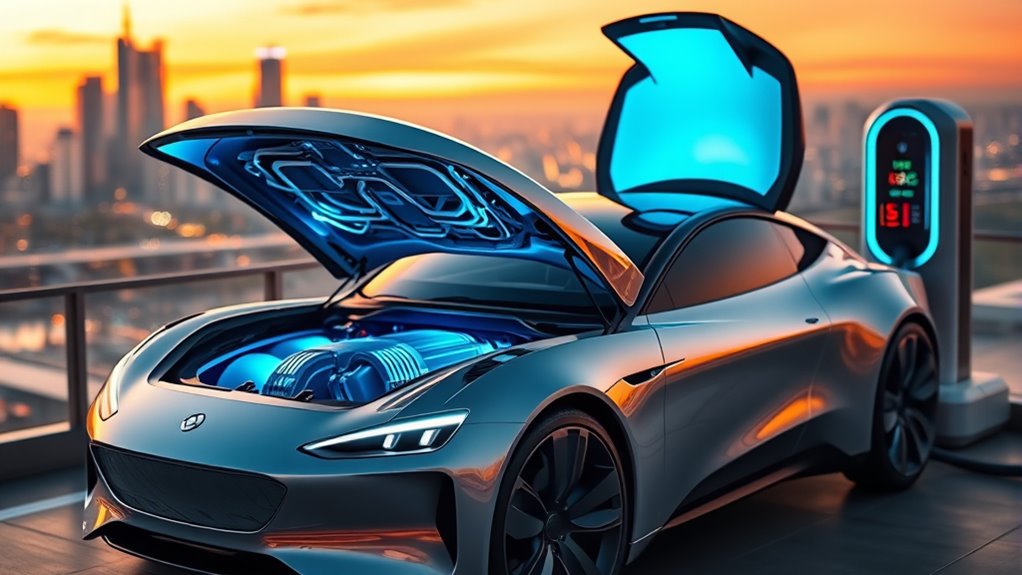
As electric vehicles (EVs) gain popularity, advancements in battery technology are crucial to enhancing their performance and sustainability.
You'll notice improvements in energy density, which means your EV can go farther on a single charge. Next-generation lithium-ion batteries are evolving, promising faster charging times and longer lifespans.
Solid-state batteries are also emerging, offering greater safety and efficiency. These innovations reduce the environmental impact of battery production and disposal, aligning with your desire for a greener future.
Additionally, recycling technologies are improving, allowing you to reclaim valuable materials from old batteries.
As these advancements unfold, you can expect to see EVs that not only meet your driving needs but also contribute to a more sustainable world.
Embrace the future of electric mobility!
Expanding Charging Infrastructure
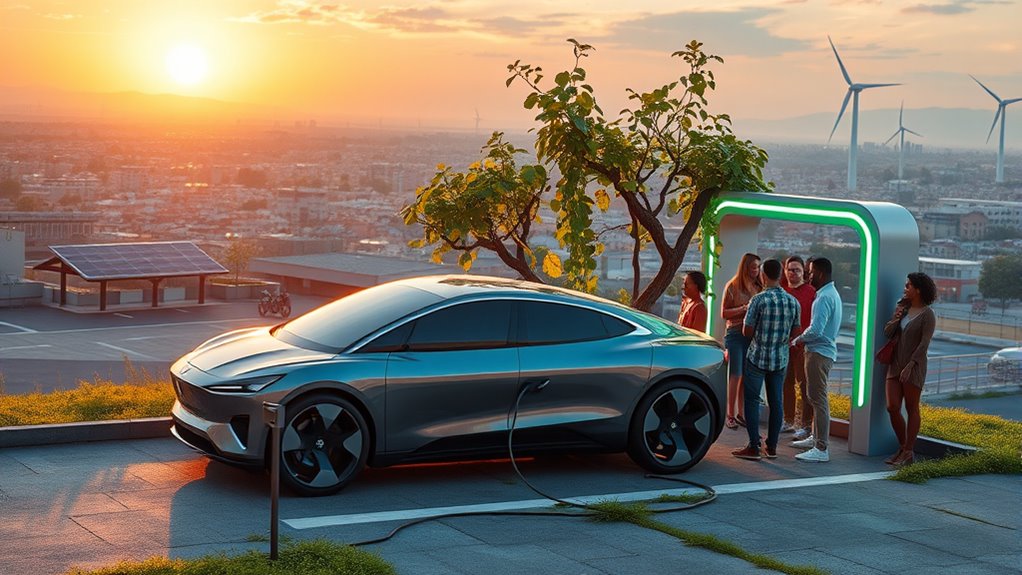
While the advancements in battery technology pave the way for longer-lasting electric vehicles, expanding charging infrastructure is equally essential for widespread adoption.
You need access to reliable charging options to make driving an electric vehicle convenient and practical. Imagine pulling up to a charging station in your neighborhood or at your workplace, knowing you can quickly recharge your vehicle.
Public charging stations and fast chargers along highways are critical to reducing range anxiety and encouraging longer trips. As more companies invest in this infrastructure, it's vital for you to stay informed about new locations and technologies.
Public charging stations and fast chargers are essential for easing range anxiety and facilitating longer journeys in electric vehicles.
With a robust network of charging stations, you'll find it easier to embrace electric driving and contribute to a sustainable future.
Government Incentives and Policies
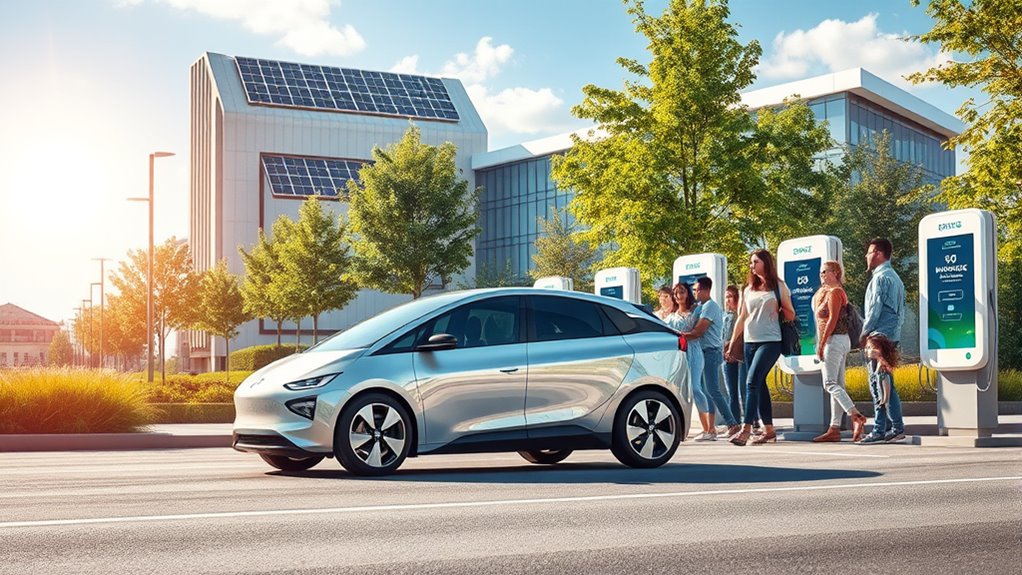
Expanding charging infrastructure is just one piece of the puzzle when it comes to promoting electric vehicles.
Government incentives and policies play a crucial role in encouraging adoption. Tax credits, rebates, and grants can significantly reduce the upfront costs of EVs for you, making them more accessible. Many states offer additional perks, like HOV lane access and reduced registration fees, to sweeten the deal.
Policies that support renewable energy sources for charging stations create a sustainable ecosystem, enhancing the appeal of EVs. Additionally, local governments often invest in public charging networks, ensuring that you have convenient options available.
As these initiatives continue to evolve, they'll make owning an electric vehicle not just a choice, but a smart and practical decision.
Autonomous Driving Capabilities
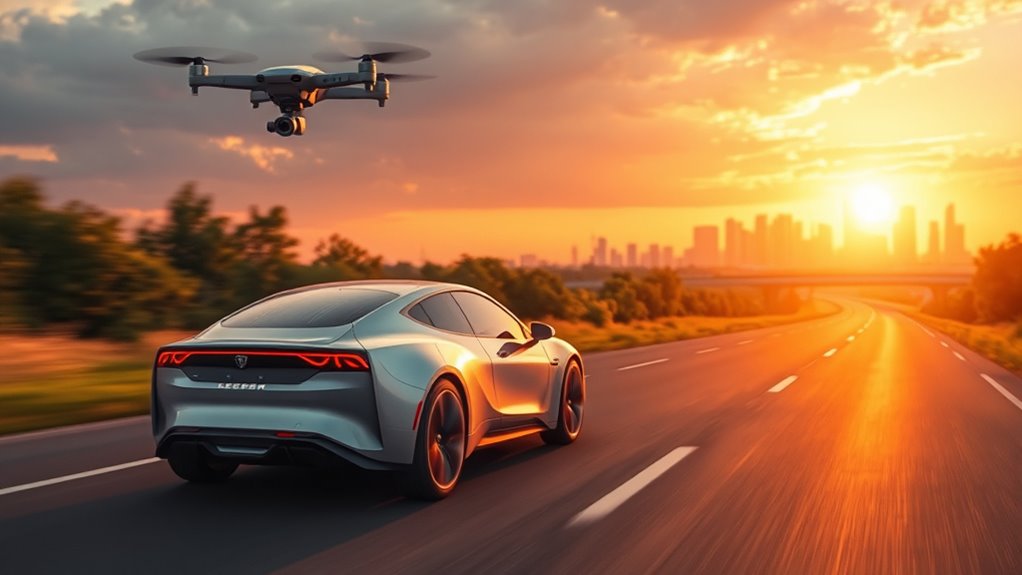
With advancements in technology rapidly transforming the automotive landscape, autonomous driving capabilities are quickly becoming one of the most exciting features of electric vehicles.
Imagine sitting back and relaxing while your car navigates through traffic, making real-time decisions. These systems rely on a combination of sensors, cameras, and artificial intelligence to interpret surroundings and ensure safety.
As manufacturers continue to refine these technologies, you can expect smoother rides, reduced traffic congestion, and increased road safety. Plus, with ongoing updates, your vehicle will learn and adapt, enhancing its performance over time.
Embracing autonomous driving means embracing a future where you can enjoy the journey without the stress of driving. The possibilities are endless, and it's an exciting time to be part of this evolution.
Integration of Renewable Energy Sources
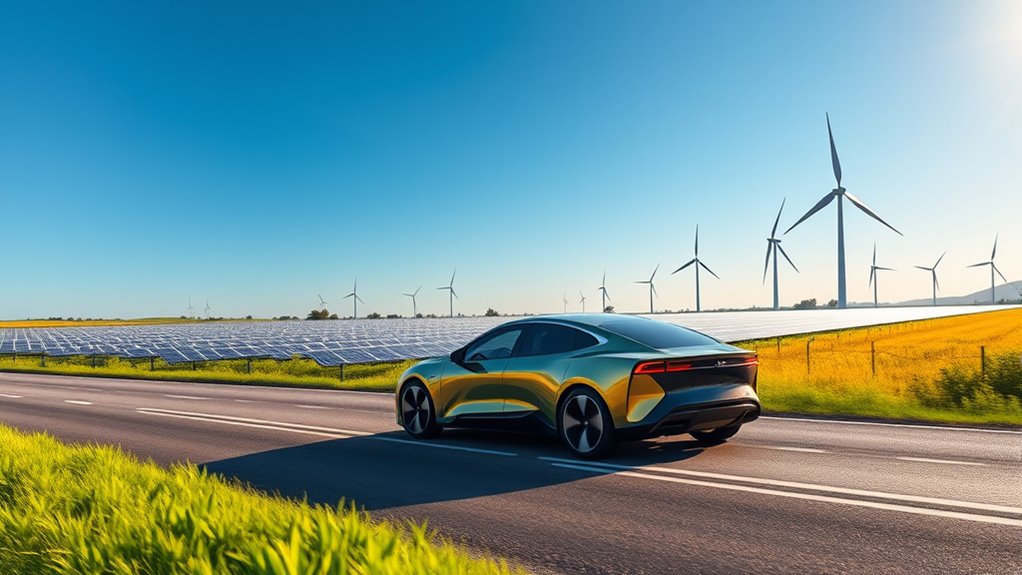
As electric vehicles (EVs) gain popularity, integrating renewable energy sources into their charging infrastructure becomes crucial for a sustainable future.
Integrating renewable energy into EV charging infrastructure is essential for a sustainable future as electric vehicles gain popularity.
You can harness solar, wind, and hydroelectric power to charge your EV, reducing reliance on fossil fuels. By installing solar panels at home or utilizing community solar programs, you can power your vehicle with clean energy.
Many public charging stations are also beginning to incorporate renewable energy, making it easier for you to charge sustainably while on the go. This shift not only lowers your carbon footprint but can also save you money in the long run.
As technology advances, expect even more seamless options for integrating renewable energy into your daily EV charging routine, making sustainable driving more accessible than ever.
Overcoming Range Anxiety
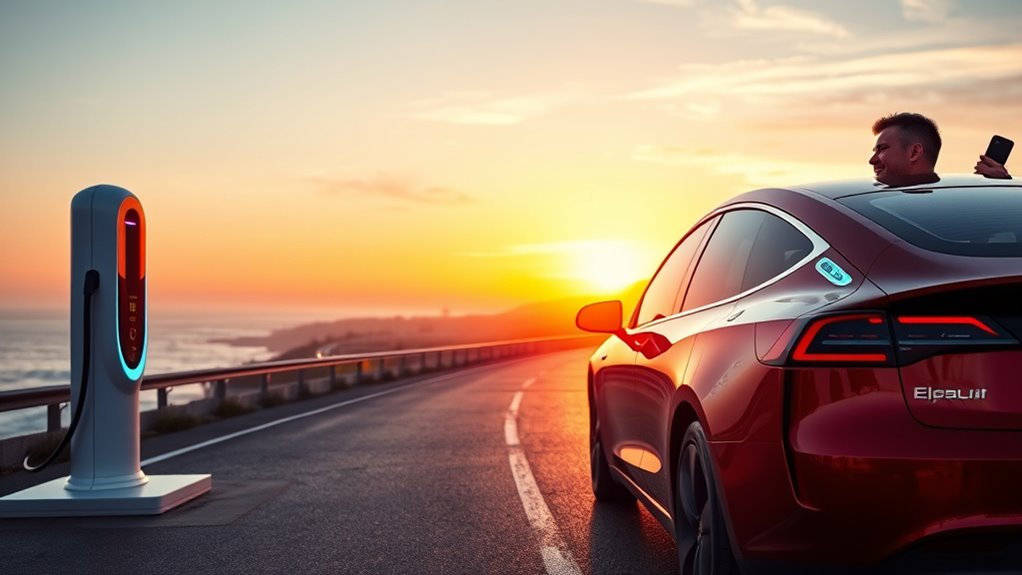
Although many potential electric vehicle (EV) owners worry about running out of battery on long trips, advancements in technology and infrastructure are steadily alleviating these concerns.
Today's EVs come equipped with improved battery ranges that can often exceed 300 miles on a single charge. Alongside this, charging networks are rapidly expanding, making it easier to find a charging station on your route. Many locations now offer fast chargers that can replenish your battery in under an hour.
Additionally, route planning apps can help you identify charging stops along your journey, ensuring you stay informed and prepared. With these developments, you can confidently embrace the electric vehicle experience and enjoy your drive without the nagging fear of range anxiety.
The Role of EVs in Urban Mobility
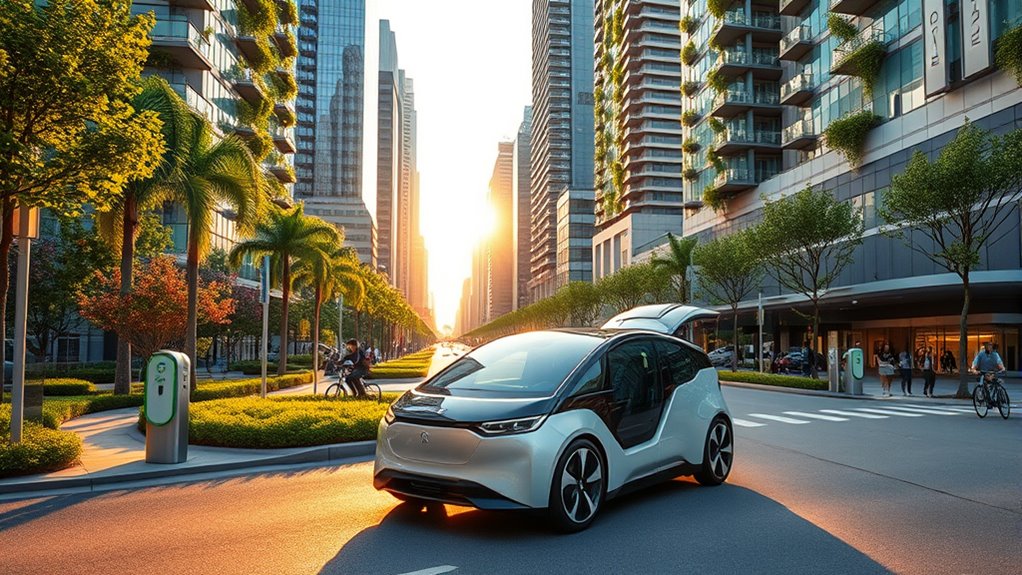
Electric vehicles (EVs) are reshaping urban mobility by providing a cleaner, more efficient alternative to traditional transportation.
As a city dweller, you'll appreciate how EVs reduce air pollution and congestion. With their quiet operation, they make your daily commute more pleasant. Plus, many urban areas are investing in charging infrastructure, making it easier for you to charge your vehicle on the go.
EVs also promote shared mobility solutions, like car-sharing and ride-hailing services, which can help reduce the number of cars on the road.
Frequently Asked Questions
How Do Electric Vehicles Impact Traditional Automotive Jobs?
Electric vehicles (EVs) are changing the landscape of traditional automotive jobs.
As you adapt to this shift, you'll notice a decline in jobs focused on internal combustion engines while new opportunities in EV manufacturing, battery production, and software development emerge.
Mechanics may need retraining to service EVs effectively.
Embracing these changes can help you stay relevant in the industry and seize the potential growth within the evolving automotive market.
What Are the Environmental Impacts of EV Battery Production?
When you look at the environmental impacts of EV battery production, you see significant concerns.
Mining for lithium, cobalt, and nickel can lead to habitat destruction and pollution. Additionally, the energy used in battery manufacturing often comes from fossil fuels, contributing to greenhouse gas emissions.
However, advances in recycling and sustainable practices are promising. By supporting eco-friendly initiatives, you can help minimize these impacts and promote a greener future for transportation.
Are There Plans for Wireless Charging Technology?
Imagine driving on a road of endless possibilities, where your car charges effortlessly, just like a bird soaring through the sky.
You'll find that there are indeed plans for wireless charging technology. Companies are developing systems that allow EVs to charge while parked or even in motion.
This innovation could transform your driving experience, making it more convenient and efficient, as you glide along without worrying about plugging in.
How Do Electric Vehicles Affect Insurance Costs?
Electric vehicles can influence your insurance costs in several ways. Generally, they might be more expensive to insure due to higher repair costs and specialized parts.
However, some insurers offer discounts for EV owners, recognizing them as lower-risk drivers.
You'll also benefit from potential savings on fuel and maintenance, which can offset higher premiums.
It's essential to shop around and compare quotes to find the best coverage for your electric vehicle.
Can Electric Vehicles Be Used for Off-Road Adventures?
You might think electric vehicles aren't suited for off-road adventures, but that's not true.
Many EVs are designed with rugged terrains in mind, featuring robust suspension systems and high torque that make tackling tough trails easier.
Brands like Rivian and Ford are already proving this point with their electric trucks and SUVs.
Conclusion
As you journey into the future of electric vehicles, think of them as a new dawn breaking over a bustling cityscape. Each innovation in battery technology, every charging station, and supportive policy are like rays of sunlight, illuminating the path ahead. Embrace the freedom of autonomous driving and the harmony of renewable energy. With every mile, those lingering doubts about range shrink, paving the way for a vibrant, eco-friendly urban mobility that's just beginning to bloom.
